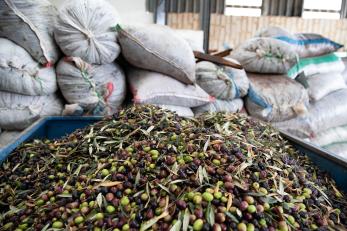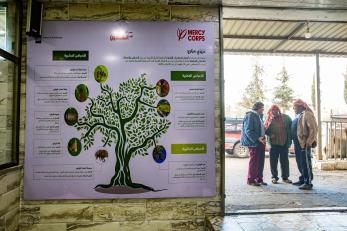Impact Evaluation of Access to Justice and Jobs Interventions in Olive Oil Chain

The Access to Justice and Jobs (A2J) program, implemented with funding from the Dutch Ministry of Foreign Affairs, aimed to increase access to decent employment opportunities in Mafraq and Irbid for Syrian refugees and low-income Jordanians, specifically targeting women and youth under 30. Under this program, Mercy Corps focused on strengthening employability skills through enabling local market growth using a market systems development approach.
Based on the Market System Assessment of the olive oil value chain that Mercy Corps conducted, results revealed key constraints and opportunities that the A2J project addressed in the program design with the aim to enhance the quality of olive oil in Irbid by improving olive production, harvesting and post-harvesting practices to pressing and marketing/linkages in the olive oil value chain. The final results are captured in an insightful video:
Here is a brief description of the end-line survey results on diverse interventions the A2J project covered during its three year duration:
Olive Seedlings
The project focused on enhancing olive seedlings by providing sub-grants to three agricultural nurseries to encourage farmers to grow higher-yield Roman olive trees, introduce air-conditioning, irrigation systems, plastic houses, and better farming equipment.
“The nursery is equipped with a heated underground system through an electric heater that was manufactured while installing a water pump.”
‑Mill owner
Agricultural and Post-harvesting Practices
By promoting essential agricultural practices that increase the quantity and quality of olives harvested, A2J increased awareness on the importance of pruning olive trees, training pruners, and conducting two pruning campaigns by offering the service at discounted prices.
The increased demand and awareness on pruning as a best farming practice was evident when comparing the results of the campaigns in 2018 and 2019. Whereby results show that the number of pruners grew from six to 35, while the number of trees pruned increased from 8,871 to 35,564 trees.
Upgrading Agricultural Extension Services
To improve farmers’ harvesting technologies and post-harvesting processes, expand their market linkages, and utilize them to improve farmers’ knowledge through educational sessions, A2J worked on upgrading agricultural extension services. Thanks to A2J, Irbid now has the first olive oil contractor who is able to cater to the needs of medium and large olive farmers.
SME Endline results show that, after the A2J intervention, all three extension services had increased customers, and noticed higher awareness amongst farmers when it comes to best farming practices.
Partnering with Olive Oil Mills

Through the well-founded relationships between mills and farmers, A2J encouraged modern best practices using reusable plastic harvest boxes which prevent crushing and oxidation. A2J established awareness rooms and conducted educational sessions to farmers on best practices throughout the olive pressing season. The awareness sessions supported mills to build linkages and strengthen relationships with local farmers in addition to influencing farmers’ olive farming practices to increase the quality and quantity of the olive oil.
Olive Pressing
The project focused on the olive pressing by conducting good manufacturing practices training for six olive oil mills in Irbid, aiming to spread awareness among mill managers, workers, and operating staff. Information disseminated served as a step forward in upgrading conventional manufacturing and operating practices in Irbid mills.
“We developed the Yarmouk mill equipment with the support from Mercy Corps, and created an awareness committee for farmers, which greatly helped our business.”
‑Yarmouk mill staff member
Promoting Olive Oil Testing
The A2J project promoted olive oil testing by training 18 Directorate of Agriculture staff from seven districts in Irbid and providing them with the needed equipment to qualify them to conduct free lab tests of olive oil samples during the olive pressing season.
According to the end-line survey, a total of 323 samples, brought in by 166 different participants, were lab tested for their acidity during the campaign. Out of the 323 samples tested, 281 (87%) passed by testing less than 2% acidity, which deems the oil safe to consume.
Marketing and Market Linkages
A2J partnered with the Irbid Directorate of Agriculture (DoA) to plan, market, and host a third Annual Olive Oil Festival in Irbid. In 2019, a total of 160 vendors participated in the festival, which included female-owned home-based businesses, Irbid mill owners, nurseries, and other local SMEs. Based on the survey conducted, 77% of respondents were able to reach new customers, 66% increased their awareness of the market, and around 23% of vendors reported increased exposure.